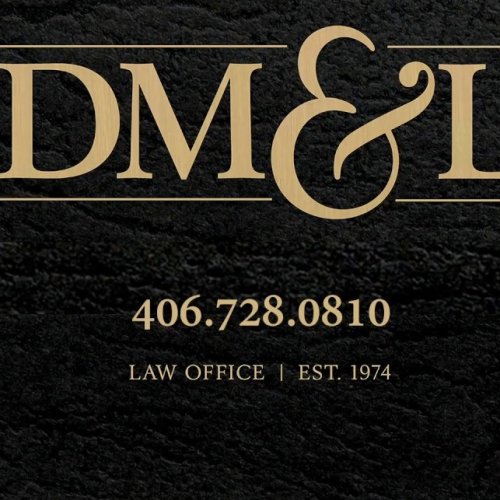Best Medical Malpractice Lawyers in Missoula
Share your needs with us, get contacted by law firms.
Free. Takes 2 min.
List of the best lawyers in Missoula, United States
About Medical Malpractice Law in Missoula, United States:
Medical malpractice refers to situations where healthcare professionals fail to provide an acceptable standard of care, resulting in harm or injury to a patient. In Missoula, United States, medical malpractice cases are governed by specific laws and regulations that ensure the rights and protection of patients. These laws determine how negligence is proven, the time limits for filing a claim, and the damages that may be awarded to the injured party.
Why You May Need a Lawyer:
Seeking legal help from a lawyer experienced in medical malpractice is crucial in certain situations. Here are some common scenarios where you may require legal assistance:
- If you believe you have been a victim of medical negligence or medical error
- If you suffered injury or harm due to a healthcare professional's mistake
- If you are unsure about the strength of your case and need guidance
- If you are facing complex legal procedures and need someone to represent your interests
- If you need to negotiate with insurance companies or healthcare providers
Local Laws Overview:
In Missoula, United States, several key aspects of local laws are relevant to medical malpractice cases. It is important to be aware of the following:
- Statute of Limitations: Montana law generally allows victims of medical malpractice two years to file a lawsuit from the date of the injury or discovery of the injury.
- Modified Comparative Fault: Montana follows the modified comparative fault rule, meaning if the injured party is found to be partially at fault, it may affect the amount of compensation they can receive.
- Expert Medical Opinion: In a medical malpractice lawsuit, expert medical opinion is often required to establish negligence or medical error. It is crucial to consult with a qualified medical professional to evaluate your case.
Frequently Asked Questions:
1. Can I sue for medical malpractice if I signed a consent form?
Signing a consent form does not necessarily absolve healthcare professionals of negligence. While consent forms indicate you are aware of the associated risks, you may still sue if the standard of care provided fell below acceptable levels, resulting in harm.
2. What damages can I recover in a medical malpractice case?
If it is proven that medical malpractice occurred, you may be entitled to various damages, including medical expenses, loss of income, pain, suffering, emotional distress, and disability or disfigurement.
3. How do I prove medical negligence or malpractice?
Proving medical negligence generally requires establishing the following elements: a duty of care, breach of that duty, causation between the breach and injury, and resulting damages. Expert medical testimony is often crucial in demonstrating these aspects.
4. Do most medical malpractice cases go to trial?
No, the majority of medical malpractice cases are resolved through settlements outside of court. However, if a fair settlement cannot be reached, the case may proceed to trial where a jury or judge will decide the outcome.
5. How long will a medical malpractice case take?
The duration of a medical malpractice case varies. Some settle relatively quickly, while others can take several years to reach a resolution. The complexity of the case, the need for expert opinions, and the parties' willingness to negotiate can all affect the timeline.
Additional Resources:
- Missoula County Bar Association - www.missoulacountybar.org
- Montana Department of Public Health and Human Services - dphhs.mt.gov
- Montana State Law Library - courts.mt.gov/library
Next Steps:
If you believe you have a medical malpractice case or need legal assistance, consider taking the following steps:
- Document and gather all relevant medical records, bills, and documents related to the medical treatment in question.
- Consult with a reputable medical malpractice lawyer who can evaluate the strength of your case and provide guidance.
- Be prepared to discuss the details of your case openly and honestly with your lawyer.
- Follow your lawyer's advice and instructions throughout the legal process.
- Keep track of important deadlines and maintain open communication with your lawyer.
Lawzana helps you find the best lawyers and law firms in Missoula through a curated and pre-screened list of qualified legal professionals. Our platform offers rankings and detailed profiles of attorneys and law firms, allowing you to compare based on practice areas, including Medical Malpractice, experience, and client feedback.
Each profile includes a description of the firm's areas of practice, client reviews, team members and partners, year of establishment, spoken languages, office locations, contact information, social media presence, and any published articles or resources. Most firms on our platform speak English and are experienced in both local and international legal matters.
Get a quote from top-rated law firms in Missoula, United States — quickly, securely, and without unnecessary hassle.
Disclaimer:
The information provided on this page is for general informational purposes only and does not constitute legal advice. While we strive to ensure the accuracy and relevance of the content, legal information may change over time, and interpretations of the law can vary. You should always consult with a qualified legal professional for advice specific to your situation.
We disclaim all liability for actions taken or not taken based on the content of this page. If you believe any information is incorrect or outdated, please contact us, and we will review and update it where appropriate.








